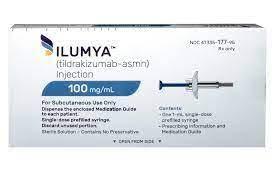Tildrakizumab Disease Interactions
There are 3 disease interactions with tildrakizumab.
Tildrakizumab (applies to tildrakizumab) tuberculosis
Major Potential Hazard, Moderate plausibility. Applicable conditions: Tuberculosis -- Active, Tuberculosis -- Latent, History - Tuberculosis
Do not administer tildrakizumab to patients with active TB infection. It is recommended to assess patients for tuberculosis (TB) infection before starting treatment with this agent. Consider anti-TB therapy prior to initiation of tildrakizumab in patients with latent TB, a past history of latent or active TB in whom an adequate course of treatment cannot be confirmed. Monitor patients for signs and symptoms of active TB during and after treatment with tildrakizumab.
Tildrakizumab (applies to tildrakizumab) infections
Moderate Potential Hazard, Moderate plausibility. Applicable conditions: Infection - Bacterial/Fungal/Protozoal/Viral
The use of tildrakizumab may increase the risk of infection. Treatment with tildrakizumab should not be started in patients with active infection until the infection resolves or is adequately treated. Consider the risks and benefits prior to using this agent in patients with chronic infection or a history of recurrent infection. It is recommended to monitor the patient closely and consider discontinuation of tildrakizumab if a patient develops a clinically important or serious infection or is not responding to standard therapy.
Tildrakizumab (applies to tildrakizumab) vaccination
Moderate Potential Hazard, Moderate plausibility.
It is recommended to avoid the use of live vaccines in patients treated with tildrakizumab. Before starting therapy with tildrakizumab, consider completion of all age appropriate immunizations according to current immunization guidelines. Care should be exercised as no data are available on the response to live or inactive vaccines.
Switch to professional interaction data
Tildrakizumab drug interactions
There are 193 drug interactions with tildrakizumab.
More about tildrakizumab
- tildrakizumab consumer information
- Check interactions
- Compare alternatives
- Reviews (8)
- Side effects
- Dosage information
- During pregnancy
- Drug class: interleukin inhibitors
- Breastfeeding
- En español
Related treatment guides
Drug Interaction Classification
| Highly clinically significant. Avoid combinations; the risk of the interaction outweighs the benefit. | |
| Moderately clinically significant. Usually avoid combinations; use it only under special circumstances. | |
| Minimally clinically significant. Minimize risk; assess risk and consider an alternative drug, take steps to circumvent the interaction risk and/or institute a monitoring plan. | |
| No interaction information available. |
See also:
Further information
Always consult your healthcare provider to ensure the information displayed on this page applies to your personal circumstances.


